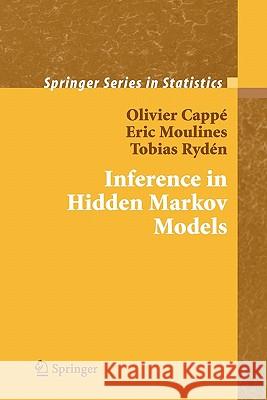Inference in Hidden Markov Models » książka
Inference in Hidden Markov Models
ISBN-13: 9781441923196 / Angielski / Miękka / 2010 / 653 str.
Hidden Markov models have become a widely used class of statistical models with applications in diverse areas such as communications engineering, bioinformatics, finance and many more. This book is a comprehensive treatment of inference for hidden Markov models, including both algorithms and statistical theory. Topics range from filtering and smoothing of the hidden Markov chain to parameter estimation, Bayesian methods and estimation of the number of states. In a unified way the book covers both models with finite state spaces, which allow for exact algorithms for filtering, estimation etc. and models with continuous state spaces (also called state-space models) requiring approximate simulation-based algorithms that are also described in detail. Simulation in hidden Markov models is addressed in five different chapters that cover both Markov chain Monte Carlo and sequential Monte Carlo approaches. Many examples illustrate the algorithms and theory. The book also carefully treats Gaussian linear state-space models and their extensions and it contains a chapter on general Markov chain theory and probabilistic aspects of hidden Markov models. This volume will suit anybody with an interest in inference for stochastic processes, and it will be useful for researchers and practitioners in areas such as statistics, signal processing, communications engineering, control theory, econometrics, finance and more. The algorithmic parts of the book do not require an advanced mathematical background, while the more theoretical parts require knowledge of probability theory at the measure-theoretical level. From the reviews: "By providing an overall survey of results obtained so far in a very readable manner, and also presenting some new ideas, this well-written book will appeal to academic researchers in the field of HMMs, with PhD students working on related topics included. It will also appeal to practitioners and researchers from other fields by guiding them through the computational steps needed for making inference HMMs and/or by providing them with the relevant underlying statistical theory. In the reviewer's opinion this book will shortly become a reference work in its field." MathSciNet "This monograph is a valuable resource. It provides a good literature review, an excellent account of the state of the art research on the necessary theory and algorithms, and ample illustrations of numerous applications of HMM. It goes much beyond the earlier resources on HMM...I anticipate this work to serve well many Technometrics readers in the coming years." Haikady N. Nagaraja for Technometrics, November 2006











